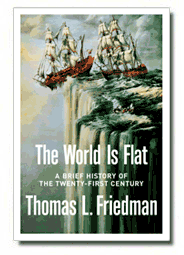
In the olden days, daring explorers set sail across the vast oceans of the sea in search of gold, spices or in the quest to expand their imperialistic powers.
These travellers came to the realisation that there was no edge at the world. It was false to believe that they will to fall into an abyss of darkness. Indeed they proclaimed that the world was round and you can go around it.
Centuries later, a Pulitzer Prize winning journalist who is a contributor to The New York Times has proved otherwise: the world is flat.
We are told the world has changed and with it everything else continues to change. So were the early explorers flat wrong?
In his thought-provoking book 'The World is Flat' Thomas Friedman reveals the maddening changes that the modern society is going through.
It is the globalization: the global connectivity, integration and interdependence in the economic, social, technological, cultural, political, and ecological spheres.
Friedman employs the metaphor of the flat world to describe how globalization—taken up to an almost sky-scraping height and down to an even more unimaginable depth—has levelled the “playing field.”
Friedman believes the world is flat in the sense that the competitive playing fields between industrial and emerging market countries are leveling. Friedman recounts many examples in which companies in India and China are becoming part of large global complex supply chains that extend across oceans through a process called outsourcing, providing everything from service representatives and X-ray interpretation to component manufacturing.
He recalls seeing such major American companies as Dell, AOL, and Microsoft using Indian teleoperators who are paid much less than their counterparts in the West. He describes how these changes were made possible through intersecting technologies, particularly the Internet, fiber-optics, and the PC.
Some opponents of globalization see the phenomenon as the promotion of free trade and corporate interests, their primary motive being to increase profit rather than creating jobs for a self-fulfilling life style.
The eighteenth century economist Adam Smith who propagated the idea of free trade spoke of “laissez-faire” economics in his book 'The Wealth of Nations.' He taught that privatized business and trade promotes more economic activity than state controlled business and thus could provide even more money from the state through the collection of income taxes.
Smith's market economics theory does not guarantee jobs or a middle-class society. Free trade lies in the principle that if trade is free, certain goods and services can be obtained at lower cost abroad than if domestic substitutes are produced in their place.
Smith's market economics has worked for the past 200 or so years in the US and the free world. The collapse of communism has added momentum to the global trend toward free trade and free markets.
During the 1990s governments across the world embraced free-trade policies, including countries that once belonged to the communist bloc, such as Russia, Poland, and China. By the early twenty-first century free trade had emerged as a cornerstone of the new global economy.
But past performance is no guarantee of future performance. The pace of change in technology is accelerating, and the economic issues and problems that result from new and unexplored territory.
Even in a flight of imagination, would Smith have envisaged the transformation that we are going through now, from blue-collar workers to knowledge-workers?
In the 21st century a new debate is raging on the benefits and the downside of globalization even while we are still on the trail of the holy grail shown to us by Smith's division of labour that is so important for production in a free market.
As Peter Drucker describes in his ' Post-Capitalist Society,' every few hundred years a sharp transformation affects the society we live in.
According to Drucker, we are right in the middle of another time of radical change, from the Age of Capitalism and the Nation-State to a Knowledge Society and a Society of Organizations.
The primary resource in the post-capitalist society will be knowledge and the leading social groups will be "knowledge workers." This transformation profoundly affects our society - its worldview, its basic values, its business and economics, and its social and political structure.
It's time to look beyond Smith's free market to solve our current problems of wealth creation, wealth distribution and a sustainable environment.
In historical terms, globalisation does provide the best reach and the maximum opportunities to solve our social problems.
Will it emerge as a level playing field? The jury is still out on this question for we have a long way to go.

No comments:
Post a Comment